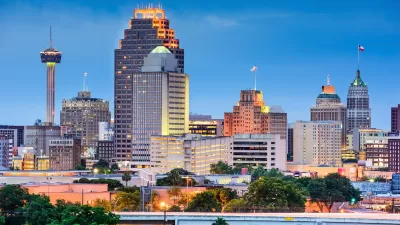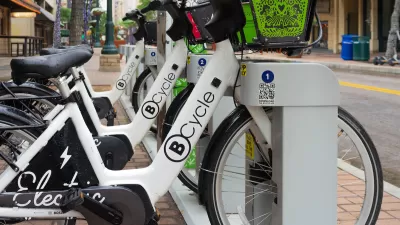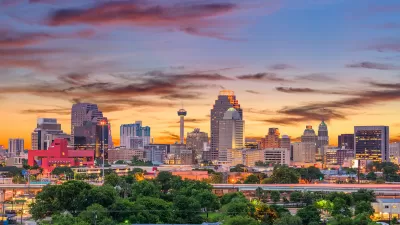After Texas relinquished control of state highways to cities in an effort to save money on maintenance costs, San Antonio planned an ambitious makeover of Broadway to accommodate pedestrian and bike improvements. The state won't approve it.

Texas Governor Greg Abbott has rejected the City of San Antonio's ambitious plan to transform Broadway from an undervalued thoroughfare into a thriving urban destination "flanked as it is by museums, parks, high-design new office buildings and thousands of popular new apartment units." As Robert Rivard writes, Abbott denied the city's plan to reduce the number of lanes to make way for bike and pedestrian infrastructure.
"What city leaders want is in essence to take the six-lane street down to four lanes, converting the recovered space into wider sidewalks, bike lanes and shade-producing trees. The purpose is to continue providing an efficient corridor to Alamo Heights and points north while better serving the thousands of residents and visitors attracted to what is fast becoming San Antonio’s most ambitiously urban neighborhood."
The fight over the street's future stems from a 2013 decision by the Texas Transportation Commission to transfer responsibility for some state routes to cities "to get them off the state maintenance rolls." While the city is eager to implement its plan, the state says it never officially made the transfer. Rivard contends that "Abbott’s move is a minor skirmish in what has become the Texas Republican war on cities and local governments." According to Rivard, "The dynamic is simple: The cities are Democratic, so the traditional conservative theory that power should be placed with the government closest to the people is obsolete."
FULL STORY: Give my regards to SL 368? Why Abbott killed San Antonio’s Broadway plan

Alabama: Trump Terminates Settlements for Black Communities Harmed By Raw Sewage
Trump deemed the landmark civil rights agreement “illegal DEI and environmental justice policy.”

Study: Maui’s Plan to Convert Vacation Rentals to Long-Term Housing Could Cause Nearly $1 Billion Economic Loss
The plan would reduce visitor accommodation by 25% resulting in 1,900 jobs lost.

Why Should We Subsidize Public Transportation?
Many public transit agencies face financial stress due to rising costs, declining fare revenue, and declining subsidies. Transit advocates must provide a strong business case for increasing public transit funding.

Wind Energy on the Rise Despite Federal Policy Reversal
The Trump administration is revoking federal support for renewable energy, but demand for new projects continues unabated.

Passengers Flock to Caltrain After Electrification
The new electric trains are running faster and more reliably, leading to strong ridership growth on the Bay Area rail system.

Texas Churches Rally Behind ‘Yes in God’s Back Yard’ Legislation
Religious leaders want the state to reduce zoning regulations to streamline leasing church-owned land to housing developers.
Urban Design for Planners 1: Software Tools
This six-course series explores essential urban design concepts using open source software and equips planners with the tools they need to participate fully in the urban design process.
Planning for Universal Design
Learn the tools for implementing Universal Design in planning regulations.
Caltrans
Smith Gee Studio
Institute for Housing and Urban Development Studies (IHS)
City of Grandview
Harvard GSD Executive Education
Toledo-Lucas County Plan Commissions
Salt Lake City
NYU Wagner Graduate School of Public Service





























